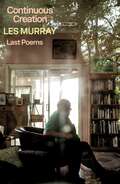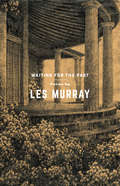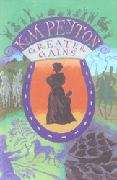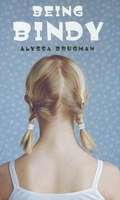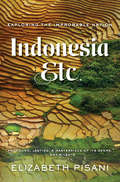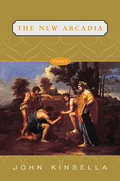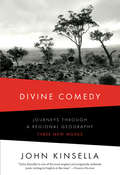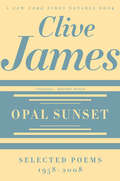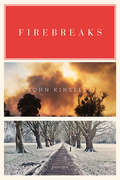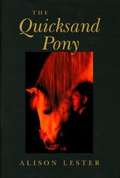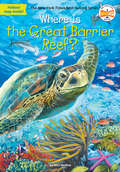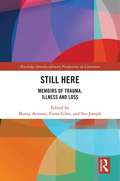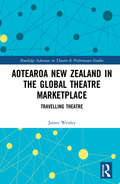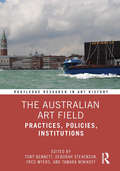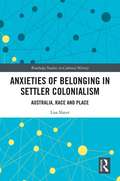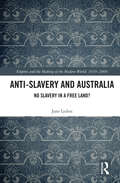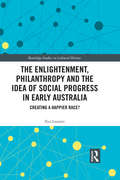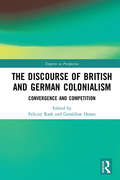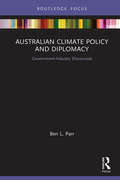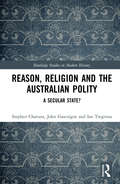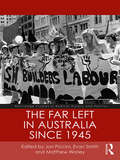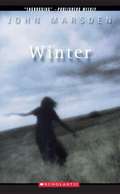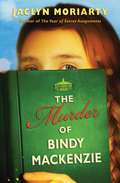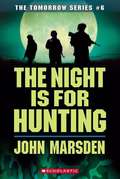- Table View
- List View
Continuous Creation: Last Poems
by Les MurrayThe final collection of poems by the great Australian poet Les Murray, Continuous CreationWe bring nothing into this worldexcept our gradual abilityto create it, out of all that vanishesand all that will outlast us.In Continuous Creation, the final collection from Les Murray, the preeminent poet of modern Australia recalls moments from his youth and wryly observes the changing world, moving back and forth through time and history with characteristic curiosity and an ever-fresh commitment to capturing the rhythms of life in verse. This collection displays Murray’s miraculous ability to reinvent language in order to plant his and our reality on the page, whether he writes about the Australian landscape (“Kangaroo sleeping / ahead on the road turns out / to be twigs and leaves”) or unsold books sitting in department stores.Continuous Creation demonstrates, once more, that Murray was one of the great poets of the English language. As Joseph Brodsky said, he was, “quite simply, the one by whom the language lives.”
Waiting for the Past: Poems
by Les MurrayIn Waiting for the Past, Les Murray employs his molten sense of language to renew and transform our experience of the world. In quicksilver verse, he conjures his rural past, the life of the poor dairy boy in Australia, as he simultaneously feels the steady tug of aging, of time pulling him back to the present. Here, syntax, sense, and sound combine with such acrobatic grace that his poems render the familiar into the unknown, the unknown into the revelatory.Whether it's a boy on a walkabout hiding from grief, a sounding whale "spilling salt rain," or leaves that "tread on the sky," the great Australian poet's sense of wonder, his ear for the everyday, his swiftness of thought are everywhere in these pages. As Derek Walcott said of Murray's work, "There is no poetry in the English language now so rooted in its sacredness, so broad-leafed in its pleasures and yet so intimate and conversational."
Greater Gains (Gains #2)
by K. M. PeytonGreater Gains continues the story of the love-hate relationship between Clara Garland and Nat Grover. Clara has been left a widow, pregnant with another man's child, and it seems as if things could not get worse. But soon her pretty and reckless youngest sister, Ellen, is harshly sentenced to deportation to the newly-discovered land of Australia, alongside many other convicts. And back in Norfolk, Clara becomes the victim of blackmail that puts her in the clutches of the wicked Nat Grover in more ways than oneaWill her pure love for Prosper Mayes ever survive? Spanning from the gritty county of Norfolk to the wilds of Australia in the early nineteenth century, the Garlands face huge obstacles in their struggle to survive as a family. Yet, they remain as inimitable and courageous as ever.
Being Bindy
by Alyssa BrugmanEighth grade is torture-at least it is for Bindy! (1) Her best friend since kindergarten becomes her worst enemy. (2) She's stuck taking yoga in sports ed, where she unleashes the Very Bad Thing that gets the whole school talking. (3) She suffers total humiliation when certain unmentionables are tossed around at assembly. What's more, Bindy's divorced parents are behaving badly. (1) Her laid-back father looks like he's falling for-could it be?- none other than her ex-best friend's mother. Which means that . . . (2) . . . Bindy's worst enemy might just end up as her sister! (3) Her domineering mom always wants Bindy to do things her way. Enough is enough! To survive the drama in her life, Bindy must make some tough decisions in this funny, searching novel about being true to yourself.
Indonesia, Etc.: Exploring the Improbable Nation
by Elizabeth PisaniAn entertaining and thought-provoking portrait of Indonesia: a rich, dynamic, and often maddening nation awash with contradictions. Jakarta tweets more than any other city on earth, but 80 million Indonesians live without electricity and many of its communities still share in ritual sacrifices. Declaring independence in 1945, Indonesia said it would "work out the details of the transfer of power etc. as soon as possible." With over 300 ethnic groups spread across 13,500 islands, the world's fourth most populous nation has been working on that "etc." ever since. Bewitched by Indonesia for twenty-five years, Elizabeth Pisani recently traveled 26,000 miles around the archipelago in search of the links that bind this impossibly disparate nation. Fearless and funny, Pisani shares her deck space with pigs and cows, bunks down in a sulfurous volcano, and takes tea with a corpse. Along the way, she observes Big Men with child brides, debates corruption and cannibalism, and ponders "sticky" traditions that cannot be erased.
The New Arcadia: Poems
by John KinsellaOne of Australia's best poets conjures the Australian countryside in this brilliant epic, inspired by Philip Sidney's classic pastoral "Arcadia." "Astonishingly fecund and inventive. The New Arcadia revitalizes pastoral traditions, but more in the mode of lamentation than celebration. Like Frost's New Hampshire and Vermont, Kinsella's Western Australia is eroded, a last act salted with the ruins of our age, and yet yielding permanent poems."--Harold Bloom
Divine Comedy: Three New Works
by John Kinsella"One of the most original and poignantly authentic poets writing in English."--Harold Bloom A three-part, epic work challenging our notions about the environment by Australia's preeminent poet of the natural world. Consisting of Purgatorio: Up Close, Paradiso: Rupture, and Inferno: Leisure Centre, John Kinsella's "distractions" on Dante's Divine Comedy journey through time and space. Set in a wheat-belt Western Australia, these poems are a phantasmagoria of the real and imagined, depicting nature in its full regalia, resisting forces of environmental damage and human indifference.
Opal Sunset: Selected Poems, 1958-2008
by Clive James"A generous helping of [James's] very best, guaranteed to lift the spirit and raise the eyebrow."--Billy Collins Opal Sunset marks the exuberant introduction of Clive James's poetry to an American audience. Praised after the publication of Cultural Amnesia as one of the finest prose stylists of his generation, Clive James is now, with the publication of this collection, being granted recognition as the poet he has always been. For much of his long career it was hard to realize that James's gift for poetry underlay his achievements in other fields. First as a television critic on Fleet Street, and later as a television personality in his own right, he achieved such fame for writing the way he spoke that his poetry was regarded as an idiosyncratic sideline, as if no celebrity could write worthy verse. A conundrum presented itself: how could a serious poet also be a television star? But for James, a duty to the discipline of verse was always fundamental, and his accumulated poetic output became impossible to ignore. As early as the 1970s, James's long, mock epic "Peregrine Prykke's Pilgrimage through the London Literary World" received almost unprecedented attention in his adopted England, while later, his satirical short poem "The Book of My Enemy Has Been Remaindered" became not only a standard verse quoted at fancy dinner parties but entered the culture as lines to be memorized by unpublished writers everywhere. James was suddenly in the odd position of having written famous poems well before he became a famous poet. Finally, the publication of a volume of his collected verse, The Book of My Enemy, earned him in 2003 the reputation as a serious poet that he has long deserved. Less inhibited by fixed categories, a new generation of critics has confirmed what James's public has instinctively known, that he brings his poems to life with all the resources to be found in his prose: wit, imagination, social observation, and a dazzling play of language. In addition, his poems have an unmistakably characteristic rhythm that makes it compulsory to read them aloud. Switching between strict stanzas and free forms as the occasion suits, James brings a compulsively readable coherence to either mode; and always, over and above the binding force of his metrical assurance, there is a lyricism that brings even the plainest statement to extra life, and which often enters deeply into realms of human emotion. His later poems about the tragedy that struck his mother and father, for example, show an intensity of regret that mark his maturity as a poet and bring out his unashamed nostalgia for his homeland, Australia. Opal Sunset is a treasure chamber of epigrammatic jewels to which the reader will return again and again.
Firebreaks: Poems
by John KinsellaA follow-up to the critically acclaimed Jam Tree Gully, Firebreaks records life and ecology in Western Australia. Known for a poetry both experimental, “activist,” and lyrical that reinvents the pastoral, John Kinsella considers his and his family’s life at Jam Tree Gully, in the Western Australian wheatbelt, and his deeply felt ecological concerns in this new cycle of poems about place, landscape, home, and absence. Part One, “Internal Exile,” explores issues of departure and return as well as alienation in Jam Tree Gully. Part Two, “Inside Out,” reevaluates how Kinsella and his family deal with ideas of “space” and proximity while also looking out into the wider world. How do we read an ecology as refuge? What lines of communication with the outside world need to be kept open? As Paul Kane observed in World Literature Today, “In Kinsella’s poetry . . . are lands marked by isolation and mundane violence and by a terrible transcendent beauty.”
Tracks
by Robyn DavidsonA cult classic with an ever-growing audience, Tracks is the brilliantly written and frequently hilarious account of a young woman's odyssey through the deserts of Australia, with no one but her dog and four camels as companions. Davidson emerges as a heroine who combines extraordinary courage with exquisite sensitivity.
The Quicksand Pony
by Alison Lester"Biddy, I'm sorry, we're going to have to leave her." "What?" Biddy struggles out of the quicksand. "You can't leave her! The tide's coming in. She'll drown!" But the pony is trapped and Biddy is forced to go on without her. The next day the only signs of Bella are hoof prints in the sand...with small footprints and the paw marks of a dog. Who has rescued Bella? Who could be so small and be alone on this remote beach? Biddy's search takes her into a wild secret country where she discovers the truth about a mysterious disappearance that happened many years ago.
Where Is the Great Barrier Reef (Where Is?)
by John Hinderliter Nico MedinaIn this Where Is? title, kids can explore the Great Barrier Reef--big enough to be seen from space but made up of billions of tiny living organisms.The Great Barrier Reef, off the coast of Australia, is the world's largest coral reef system. Stretching more than 1,400 miles, it provides a home to a wide diversity of creatures. Designated a World Heritage Site, the reef is suffering from the effects of climate change but this fascinating book shows this spectacular part of our planet. From the Trade Paperback edition.
Still Here: Memoirs of Trauma, Illness and Loss (Routledge Interdisciplinary Perspectives on Literature)
by Bunty Avieson Fiona Giles Sue JosephStill Here: Memoirs of Trauma, Illness and Loss explores the history, ethics, and cross-cultural range of memoirs focusing on illness, death, loss, displacement, and other experiences of trauma. From Walt Whitman’s Civil War diaries to kitchen table survivor-to-survivor storytelling following Hurricane Katrina, from social media posts from a refugee detention centre, to poetry by exiles fleeing war zones, the collection investigates trauma memoir writing as healing, as documentation of suffering and disability, and as political activism. Editors Bunty Avieson, Fiona Giles and Sue Joseph have brought together this scholarly collection as a sequel to their earlier Mediating Memory (Routledge 2018), providing a closer look at the specific concerns of trauma memoir, including conflict and intergenerational trauma; the therapeutic potential and risks of trauma life writing; its ethical challenges; and trauma memoir giving voice to minority experiences.
Aotearoa New Zealand in the Global Theatre Marketplace: Travelling Theatre (Routledge Advances in Theatre & Performance Studies)
by James WenleyAotearoa New Zealand in the Global Theatre Marketplace offers a case study of how the theatre of Aotearoa has toured, represented and marketed itself on the global stage. How has New Zealand work attempted to stand out, differentiate itself, and get seen by audiences internationally? This book examines the journeys of a dynamic range of culturally and theatrically innovative works created by Aotearoa New Zealand theatre makers that have toured and been performed across time, place and theatrical space: from Moana Oceania to the Edinburgh Festival Fringe, from a Māori Shakespeare adaptation to an immersive zombie theatre experience. Drawing on postcolonialism, transnationalism, cosmopolitanism and globality to understand how Aotearoa New Zealand has imagined and conceived of itself through drama, the author investigates how these representations might be read and received by audiences around the world, variously reinforcing and complicating conceptions of New Zealand national identity. Developing concepts of theatrical mobility, portability and the market, this study engages with the whole theatrical enterprise as a play travels from concept and scripting through to funding, marketing, performance and the critical response by reviewers and commentators. This book will be of global interest to academics, producers and theatre artists as a significant resource for the theory and practice of theatre touring and cross-cultural performance and reception.
The Australian Art Field: Practices, Policies, Institutions (Routledge Research in Art History)
by Tony Bennett Deborah Stevenson Fred Myers Tamara WinikoffThis book brings together leading scholars and practitioners to take stock of the frictions generated by a tumultuous time in the Australian art field and to probe what the crises might mean for the future of the arts in Australia. Specific topics include national and international art markets; art practices in their broader social and political contexts; social relations and institutions and their role in contemporary Australian art; the policy regimes and funding programmes of Australian governments; and national and international art markets. In addition, the collection will pay detailed attention to the field of indigenous art and the work of Indigenous artists. This book will be of interest to scholars in contemporary art, art history, cultural studies, and Indigenous peoples.
Anxieties of Belonging in Settler Colonialism: Australia, Race and Place (Routledge Studies in Cultural History #65)
by Lisa SlaterThis book analyses the anxiety "well-intentioned" settler Australian women experience when engaging with Indigenous politics. Drawing upon cultural theory and studies of affect and emotion, Slater argues that settler anxiety is an historical subjectivity which shapes perception and senses of belonging. Why does Indigenous political will continue to provoke and disturb? How does settler anxiety inform public opinion and "solutions" to Indigenous inequality? In its rigorous interrogation of the dynamics of settler colonialism, emotions and ethical belonging, Anxieties of Belonging has far-reaching implications for understanding Indigenous-settler relations.
Anti-Slavery and Australia: No Slavery in a Free Land? (Empire and the Making of the Modern World, 1650-2000)
by Jane LydonBringing the histories of British anti-slavery and Australian colonization together changes our view of both. This book explores the anti-slavery movement in imperial scope, arguing that colonization in Australasia facilitated emancipation in the Caribbean, even as abolition powerfully shaped the Settler Revolution. The anti-slavery campaign was deeply entwined with the administration of the empire and its diverse peoples, as well as the radical changes demanded by industrialization and rapid social change in Britain. Abolition posed problems to which colonial expansion provided the answer, intimately linking the end of slavery to systematic colonization and Indigenous dispossession. By defining slavery in the Caribbean as the opposite of freedom, a lasting impact of abolition was to relegate other forms of oppression to lesser status, or to deny them. Through the shared concerns of abolitionists, slave-owners, and colonizers, a plastic ideology of ‘free labour’ was embedded within post-emancipation imperialist geopolitics, justifying the proliferation of new forms of unfree labour and defining new racial categories. The celebration of abolition has overshadowed post-emancipation continuities and transformations of slavery that continue to shape the modern world.
The Enlightenment, Philanthropy and the Idea of Social Progress in Early Australia: Creating a Happier Race? (Routledge Studies in Cultural History #63)
by Ilya LazarevThis book seeks to highlight the influence of the Enlightenment idea of social progress on the character of the "civilising mission" in early Australia by tracing its presence in the various "civilising" attempts undertaken between 1788 and 1850. It also represents an attempt to marry the history of the British Enlightenment and the history of settler-Aboriginal interactions. The chronological structure of the book, as well as the breadth of its content, will facilitate the readers’ understanding of the evolution of "civilising attempts" and their epistemological underpinnings, while throwing additional light on the influence of the Enlightenment on Australian history as a whole.
The Discourse of British and German Colonialism: Convergence and Competition (Empires in Perspective)
by Felicity RashThis volume compares and contrasts British and German colonialist discourses from a variety of angles: philosophical, political, social, economic, legal, and discourse-linguistic. British and German cooperation and competition are presented as complementary forces in the European colonial project from as early as the sixteenth century but especially after the foundation of the German Second Empire in 1871 – the era of the so-called 'Scramble for Africa'. The authors present the points of view not only of the colonizing nations, but also of former colonies, including Cameroon, Ghana, Morocco, Namibia, Tanzania, India, China, and the Pacific Islands. The title will prove invaluable for students and researchers working on British colonial history, German colonial history and post-colonial studies.
Australian Climate Policy and Diplomacy: Government-Industry Discourses (Routledge Focus on Environment and Sustainability)
by Ben L. ParrAustralian Climate Policy and Diplomacy provides a well overdue critique of existing, and high-profile, publications that convey the ‘greenhouse mafia’ hypothesis, which posits that Australia’s weak policy response to climate change is the result of a menacing domestic fossil fuel lobby. Ben L. Parr argues that the shared government–industry discourse about protecting Australia’s industrial competitiveness has had a more decisive influence in shaping and legitimising Australian climate policy than the direct lobbying tactics of the fossil fuel industry. Parr also reveals how the divergent foreign policy discourses and traditions of Australia’s two major political parties – as internationalist versus alliance-focused – have enabled and constrained their climate diplomacy and domestic policies over time. To demonstrate his argument, he presents a discourse analysis woven into a chronological policy narrative, comprising more than 1000 primary texts (media releases, interviews, and speeches) generated by prime ministers and key fossil fuel lobbyists. Overall, this volume illustrates how domestic forces have and are influencing Australia’s climate policy. In doing so, it also provides a framework that can be adapted to examine climate mitigation policies in other countries, notably Canada and the US. This book will be of interest to students and scholars of climate change, environmental policy and governance, and Australian climate change policy and politics more specifically, as well as policymakers and practitioners working in these fields.
Reason, Religion and the Australian Polity: A Secular State? (Routledge Studies in Modern History)
by Stephen A. Chavura John Gascoigne Ian TregenzaHow did the concept of the secular state emerge and evolve in Australia and how has it impacted on its institutions? This is the most comprehensive study to date on the relationship between religion and the state in Australian history, focusing on the meaning of political secularity in a society that was from the beginning marked by a high degree of religious plurality. This book tracks the rise and fall of the established Church of England, the transition to plural establishments, the struggle for a public Christian-secular education system, and the eventual separation of church and state throughout the colonies. The study is unique in that it does not restrict its concern with religion to the churches but also examines how religious concepts and ideals infused apparently secular political and social thought and movements making the case that much Australian thought and institution building has had a sacral-secular quality. Social welfare reform, nationalism, and emerging conceptions of citizenship and civilization were heavily influenced by religious ideals, rendering problematic traditional linear narratives of secularisation as the decline of religion. Finally the book considers present day pluralist Australia and new understandings of state secularity in light of massive social changes over recent generations.
The Far Left in Australia since 1945 (Routledge Studies in Radical History and Politics)
by Jon Piccini Evan Smith Matthew WorleyThe far left in Australia had significant effects on post-war politics, culture and society. The Communist Party of Australia (CPA) ended World War II with some 20,000 members, and despite the harsh and vitriolic Cold War climate of the 1950s, seeded or provided impetus for the re-emergence of other movements. Radicals subscribing to ideologies beyond the Soviet orbit – Maoists, Trotskyists, anarchists and others – also created parties and organisations and led movements. All of these different far left parties and movements changed and shifted during time, responding to one political crisis or another, but they remained steadfastly devoted to a better world. This collection, bringing together 14 chapters from leading and emerging figures in the Australian and international historical profession, for the first time charts some of these significant moments and interventions, revealing the Australian far left’s often forgotten contribution to the nation’s history.
Winter
by John MarsdenFor 12 years Winter has been haunted. And now, at 16, she must head back to her old home, where a pair of family tragedies forever altered her life. What she discovers is powerful and shocking but must be dealt with in order for life to go on.
The Murder of Bindy Mackenzie
by Jaclyn MoriartyBindy Mackenzie is the most perfect girl at Ashbury High. She scores in the 99.9th percentile in all her classes. Clearly, Bindy has everything under control...Until her oh-so-perfect life starts falling oh-so-perfectly apart. She falls asleep in class. She fails an exam for the first time ever. And she can't stop thinking about handsome Finnegan Blonde. Is it a conspiracy? Madness? Or even murder? The clues are in Bindy's transcripts. The detectives are her fellow students. But Bindy has made every one of them into an enemy...and time is running out.
The Night Is for Hunting (The Tomorrow Series #6)
by John MarsdenAmidst a brutal war with no end in sight, Ellie and her four remaining friends discover that their hidden refuge becomes a crowded place when they decide to care for an uncooperative crew of orphans. Things only get worse when Ellie and Homer learn that mysterious visitors have discovered their sanctuary. Has the enemy found them out? Five ordinary teens brave the worst in this electrifying continuation of their battle to stay safe and sane in a war zone that was once their home.
